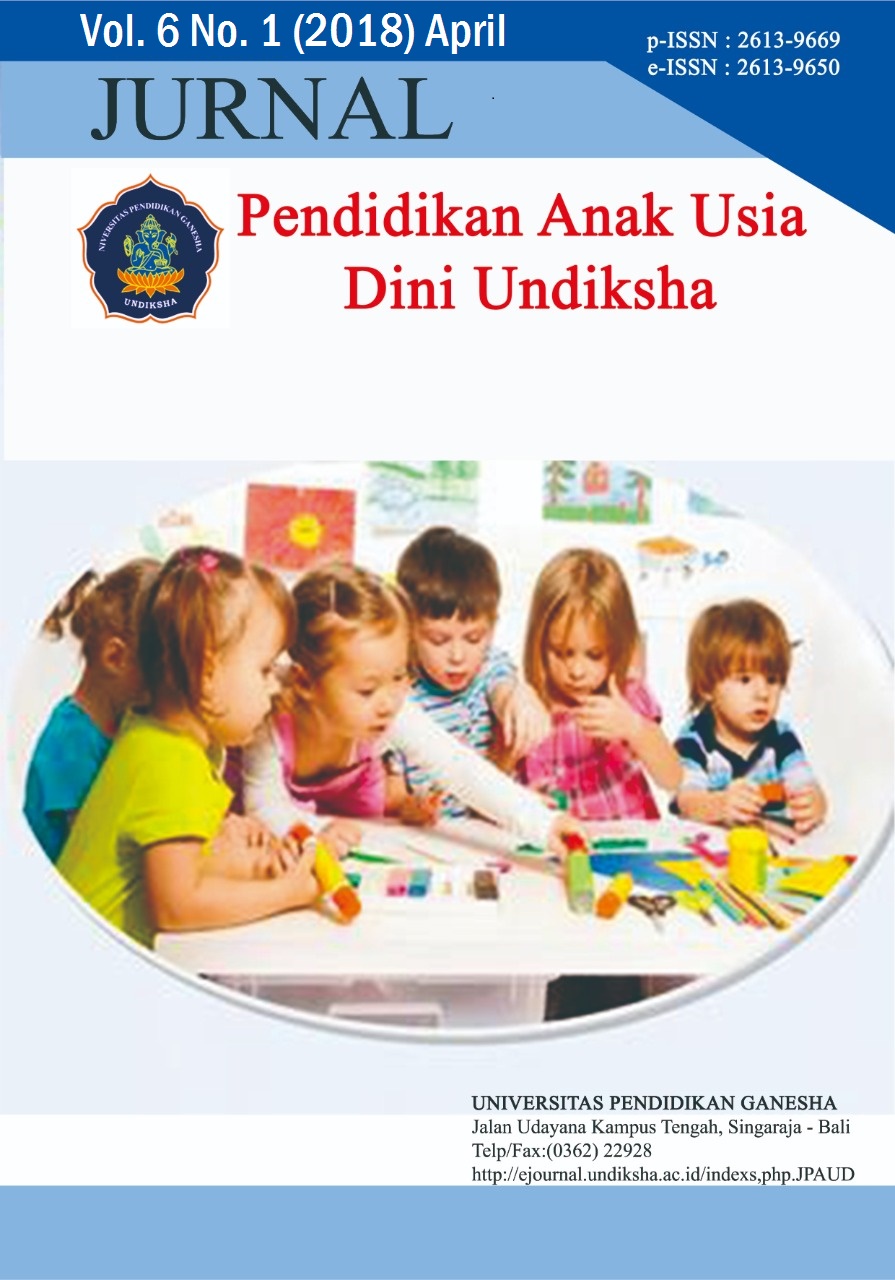Pengaruh Pendekatan Saintifik Terhadap Kemampuan Berpikir Logis Pada Anak Kelompok B PAUD Kumara Asri Denpasar Selatan Tahun Pelajaran 2017/2018
DOI:
https://doi.org/10.23887/paud.v6i1.15177Abstract
Penelitian ini bertujuan untuk mengetahui pengaruh pendekatan saintifik terhadap kemampuan berpikir logis pada anak kelompok B PAUD Kumara Asri Denpasar Selatan Tahun Pelajaran 2017/2018. Kemampuan berpikir logis merupakan kemampuan berpikir menggunakan logika, rasional, masuk akal, dan dapat diterima oleh akal sehat. Penelitian ini merupakan penelitian quasi eksperiment dengan rancangan yang digunakan adalah Nonequivalent Control Group Design. Sampel yang digunakan pada penelitian ini berjumlah 51 anak. Penentuan sampel yaitu dengan menggunakan teknik random sampling. Pada kelompok eksperimen dibelajarkan dengan pendekatan saintifik sedangkan pada kelompok kontrol dibelajarkan dengan pembelajaran konvensional. Pengumpulan data dilakukan dengan menggunakan metode tes. Data yang diperoleh dianalisis menggunakan uji-t. Hasil analisis diperoleh thitung = 7,828 pada taraf signifikansi 5% dengan dk 49 diperoleh ttabel = 2,000 sehingga thitung 7,828 > ttabel = 2,000. Berdasarkan kriteria pengujian, maka H0 ditolak. Adapun nilai rata-rata kemampuan berpikir logis pada kelompok anak yang dibelajarkan dengan pendekatan saintifik adalah 74,69 sedangkan pada kelompok anak yang dibelajarkan dengan pembelajaran konvensional adalah 59,8. Dengan demikian, dapat disimpulkan bahwa pendekatan saintifik dapat berpengaruh terhadap kemampuan berpikir logis pada anak kelompok B PAUD Kumara Asri Denpasar Selatan Tahun Pelajaran 2017/2018. Berdasarkan simpulan tersebut, maka disarankan kepada guru agar menciptakan suasana belajar yang efektif dan menyenangkan dengan menerapkan strategi pembelajaran yang inovatif agar kemampuan berpikir logis anak meningkat.Kata Kunci : kemampuan berpikir logis, pendekatan saintifik, PAUD kelompok B
This research aims to determine the influence of scientific approach to logical thinking ability in children group B PAUD Kumara Asri South Denpasar Lesson Year 2017/2018. The ability to think logically is the ability to think using logic, rational, reasonable, and acceptable to common sense. This research is a quasi experimental research with the design used is Nonequivalent Control Group Design. The sample used in this study amounted to 51 children. Determination of sample that is by using random sampling technique. In the experimental group with scientific approach while in the control group dibelajarkan with conventional learning. Data collection is done by using test method. The obtained were analyzed using the t-test. The result of analysis is obtained tcount = 7,828 at significance level 5% with dk 49 obtained ttable = 2,000 so thitung 7,828> ttable = 2,000. Based on the test criteria, then H0 is rejected. The average value of logical thinking ability in groups of children who were taught by scientific approach was 74,69 while in the group of children who were taught by conventional learning was 59.8. Thus, it can be concluded that the scientific approach can affect the ability to think logically in children group B PAUD Kumara Asri South Denpasar Lesson Year 2017/2018. Based on these conclusions, it is advisable for teachers to create an effective and fun learning atmosphere by implementing innovative learning strategies to improve children's logical thinking skills.
keyword : logical thinking ability, scientific approach, early childhood
Downloads
Published
2018-07-26
How to Cite
., N. N. S., ., D. I. K. A., & ., L. A. T. S. (2018). Pengaruh Pendekatan Saintifik Terhadap Kemampuan Berpikir Logis Pada Anak Kelompok B PAUD Kumara Asri Denpasar Selatan Tahun Pelajaran 2017/2018. Jurnal Pendidikan Anak Usia Dini Undiksha, 6(1), 95–104. https://doi.org/10.23887/paud.v6i1.15177
Issue
Section
Articles
License
Authors who publish with the Jurnal Pendidikan Anak Usia Dini Undiksha agree to the following terms:
- Authors retain copyright and grant the journal the right of first publication with the work simultaneously licensed under a Creative Commons Attribution License (CC BY-SA 4.0) that allows others to share the work with an acknowledgment of the work's authorship and initial publication in this journal.
- Authors are able to enter into separate, additional contractual arrangements for the non-exclusive distribution of the journal's published version of the work (e.g., post it to an institutional repository or publish it in a book), with an acknowledgment of its initial publication in this journal.
- Authors are permitted and encouraged to post their work online (e.g., in institutional repositories or on their website) prior to and during the submission process, as it can lead to productive exchanges, as well as earlier and greater citation of published work. (See The Effect of Open Access)











